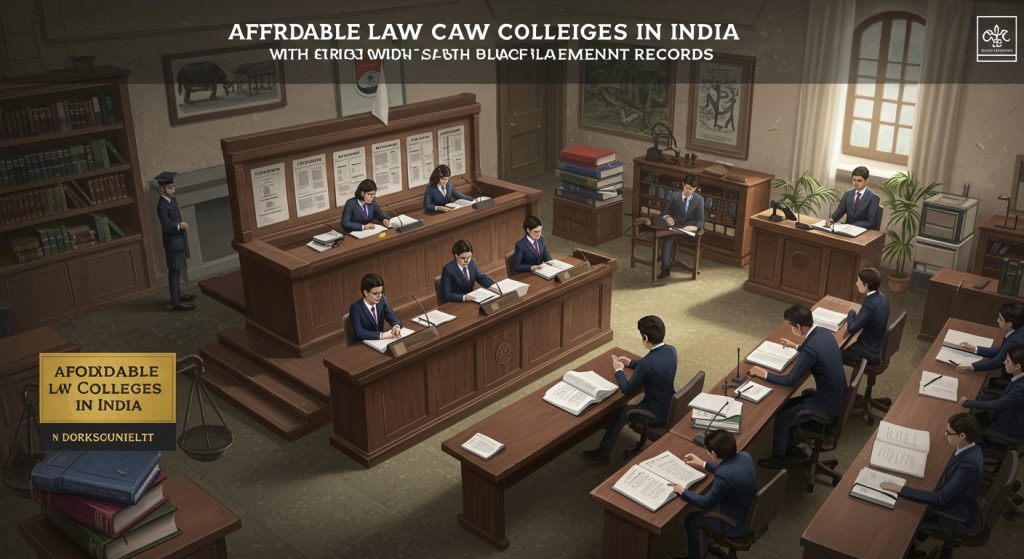India’s legal landscape is rapidly evolving, demanding skilled professionals adept at navigating complex regulations and emerging fields like AI law and data privacy. Choosing the right institution is paramount for aspiring lawyers aiming to shape this future. This exploration identifies ten premier Indian law colleges, emphasizing factors beyond traditional rankings. We delve into each institution’s unique strengths – faculty expertise, specialized programs, moot court success. Alumni networks – offering insights into which best aligns with individual career aspirations, be it corporate law, human rights advocacy, or judicial service. By examining these institutions, prospective students can strategically plan their legal education and future career paths.
What to Look for in a Law School
Before diving into the list, let’s consider the key attributes of a top-tier law school:
- Faculty: Experienced and knowledgeable professors are crucial. Look for faculty with strong academic backgrounds, publications. Practical experience.
- Curriculum: A comprehensive and updated curriculum that covers all aspects of law, including emerging fields.
- Infrastructure: Well-equipped libraries, moot court halls, computer labs. Comfortable classrooms are essential for a conducive learning environment.
- Moot Court Competitions: Active participation in moot court competitions hones advocacy skills and provides practical experience.
- Internship Opportunities: Strong industry connections and placement cells that facilitate internships in reputed law firms, corporations. NGOs.
- Research Culture: Encouragement of research and publication through journals, seminars. Research grants.
- Alumni Network: A strong and active alumni network can provide valuable mentorship and career opportunities.
The Top 10 Law Colleges in India
Here’s a rundown of the top 10 law colleges in India, known for their academic excellence and contribution to the legal profession:
- National Law School of India University (NLSIU), Bangalore: Arguably the most prestigious law school in India, NLSIU Bangalore consistently ranks at the top. Its rigorous academic curriculum, highly qualified faculty. Focus on research make it a sought-after institution. NLSIU pioneered the five-year integrated law program in India.
- National Academy of Legal Studies and Research (NALSAR) University of Law, Hyderabad: NALSAR Hyderabad is another top-tier law school known for its academic rigor and focus on contemporary legal issues. It offers a wide range of specialized courses and conducts extensive research in various areas of law.
- The WB National University of Juridical Sciences (NUJS), Kolkata: NUJS Kolkata is a leading law school with a strong emphasis on social justice and legal reform. It offers a diverse range of programs and encourages students to engage in research and advocacy.
- National Law University, Jodhpur (NLUJ): NLUJ Jodhpur is known for its innovative curriculum and focus on practical legal training. It offers specialized courses in areas like corporate law, intellectual property law. Criminal law.
- Gujarat National Law University (GNLU), Gandhinagar: GNLU Gandhinagar has established itself as a premier law school with a strong emphasis on research and international collaborations. It offers a wide range of specialized courses and conducts various conferences and seminars.
- Symbiosis Law School (SLS), Pune: SLS Pune is a well-reputed private law school known for its industry-oriented curriculum and strong placement record. It offers a variety of specialized courses and provides students with ample opportunities for internships and practical training.
- Jindal Global Law School (JGLS), Sonipat: JGLS Sonipat is a relatively new but rapidly growing law school known for its world-class infrastructure, international faculty. Innovative curriculum. It offers a wide range of specialized courses and encourages students to engage in research and advocacy.
- Faculty of Law, University of Delhi: The Faculty of Law at the University of Delhi is one of the oldest and most established law schools in India. It offers a three-year LLB program and is known for its experienced faculty and strong alumni network.
- Government Law College (GLC), Mumbai: GLC Mumbai is another prestigious law school with a long and distinguished history. It offers a three-year LLB program and is known for its experienced faculty and affordable fees.
- Nirma University, Institute of Law, Ahmedabad: Nirma University’s Institute of Law has quickly gained recognition for its well-structured programs, experienced faculty. Focus on practical training. It offers a five-year integrated law program and encourages students to participate in moot court competitions and internships.
A Closer Look at Key Differentiators
While all these colleges offer excellent legal education, some key differentiators can help you narrow down your choices:
| College | Focus Area | Notable Features |
|---|---|---|
| NLSIU Bangalore | Research and Academic Excellence | Pioneering 5-year program, strong research focus, highly competitive admissions. |
| NALSAR Hyderabad | Contemporary Legal Issues | Focus on social justice, specialized courses in emerging areas of law. |
| NUJS Kolkata | Social Justice and Legal Reform | Strong emphasis on advocacy, diverse range of programs. |
| NLUJ Jodhpur | Practical Legal Training | Innovative curriculum, specialized courses in corporate and criminal law. |
| GNLU Gandhinagar | International Collaborations | Strong research focus, international exchange programs. |
| SLS Pune | Industry-Oriented Curriculum | Strong placement record, ample internship opportunities. |
| JGLS Sonipat | Global Perspective | International faculty, world-class infrastructure, innovative curriculum. |
| Faculty of Law, Delhi University | Established Reputation | Long history, experienced faculty, strong alumni network. |
| GLC Mumbai | Affordable Education | Prestigious history, experienced faculty, affordable fees. |
| Nirma University, Institute of Law | Practical Training and Modern Curriculum | Focus on moot courts and internships, well-structured program. |
Real-World Applications and Career Paths
A law degree from a top Indian law school opens doors to a wide range of career paths:
- Litigation: Representing clients in courts and tribunals.
- Corporate Law: Advising companies on legal matters, mergers and acquisitions. Regulatory compliance.
- Legal Research: Conducting legal research for law firms, government agencies. Academic institutions.
- Judiciary: Aspiring to become judges in various courts.
- Civil Services: Joining the Indian Administrative Service (IAS) or other civil services.
- Academia: Teaching law at universities and colleges.
- International Law: Working for international organizations and NGOs.
- Legal Journalism: Reporting on legal issues and court proceedings.
For instance, many graduates from NLSIU Bangalore have gone on to become leading lawyers, judges. Academics, shaping the legal landscape of India. Similarly, NALSAR Hyderabad alumni are actively involved in policy making and legal reform initiatives. Several graduates from GNLU have secured placements in international law firms, demonstrating the global recognition of Indian law schools. Some law schools have partnerships with international universities, such as the Top Law Schools for International Law, enhancing the students’ global exposure.
The Importance of CLAT and Other Entrance Exams
Admission to most of these top law schools is highly competitive and requires clearing entrance exams like the Common Law Admission Test (CLAT). CLAT is a national-level entrance exam conducted for admission to undergraduate and postgraduate law programs offered by the participating National Law Universities (NLUs). Some private law schools may conduct their own entrance exams or accept CLAT scores. Preparing diligently for these exams is crucial for securing admission to your dream law school.
Making the Right Choice
Choosing the right law school is a personal decision that depends on your individual interests, career goals. Financial resources. Consider the factors discussed in this article, visit the campuses if possible. Talk to current students and alumni to get a better understanding of each institution. Remember to research the faculty, curriculum, infrastructure. Placement records before making your final decision. Good luck!
Conclusion
Choosing the right law college in India is a pivotal first step. The journey to becoming a successful lawyer extends far beyond these hallowed halls. Remember, academic excellence alone isn’t enough. Develop strong communication skills, hone your critical thinking abilities. Cultivate a deep understanding of ethical principles. The legal landscape is constantly evolving, with emerging areas like technology law becoming increasingly crucial. Consider specializing in fields that align with your passions and future industry trends. As someone who has mentored countless law students, I’ve seen firsthand that success hinges on proactive engagement – participate in moot courts, internships. Legal aid clinics. These experiences provide invaluable practical knowledge and networking opportunities. Don’t be afraid to reach out to alumni and practicing lawyers for guidance. The path may be challenging. With dedication, perseverance. A commitment to justice, you can achieve your aspirations and make a meaningful contribution to society.
FAQs
So, everyone’s talking about ‘top law schools’ in India. What actually makes a law school ‘top’? What are we looking at?
Good question! It’s not just about fancy buildings. Things like faculty expertise (are they well-published, experienced?) , the quality of their curriculum (is it up-to-date and relevant?) , placement rates (where do graduates end up working?).Even research opportunities (can you get involved in interesting projects?) all contribute to a school’s ranking. Reputation also plays a big part, of course.
Okay, got it. But if I’m looking at these ‘Top 10’ lists, are they all the same? Do rankings even matter?
That’s the million-dollar question! No, not all rankings are created equal. Different ranking organizations use different criteria, so you’ll see variations. And yes, rankings do matter. Don’t treat them as the be-all and end-all. Use them as a starting point for your research, not the only factor in your decision. Consider what’s essential to you – location, specific programs, campus culture, etc.
Assuming there’s some agreement, can you give me a general idea of which colleges usually pop up on these ‘Top 10 Indian Law Schools’ lists?
Sure! You’ll almost always see the National Law School of India University (NLSIU) Bangalore, NALSAR University of Law Hyderabad. The National Law University (NLU) Delhi consistently ranked very highly. The other NLUs, like those in Kolkata, Jodhpur. Gandhinagar, are usually in the mix too. Some private institutions like Symbiosis Law School and Jindal Global Law School also feature prominently.
What kind of entrance exams do you need to crack to get into these top law schools?
Mostly CLAT (Common Law Admission Test) for the NLUs. Some private colleges like Jindal have their own entrance exams. Others accept LSAT-India scores. So, you’ll need to research the specific requirements for each school you’re interested in.
Alright, so let’s say I get into one of these top schools. What career paths typically open up after graduation?
The world’s your oyster! Litigation (becoming a lawyer in court) is a classic route, of course. But you could also go into corporate law, working for companies on contracts, mergers, etc. Other options include working for NGOs, government agencies, becoming a legal academic, or even exploring fields like journalism or policy-making where a legal background is super valuable.
Are these ‘top’ law schools super expensive? Like, will I need to sell a kidney to afford them?
Sadly, yes, they can be quite pricey. The NLUs, though government-funded, still have significant tuition fees. Private institutions are generally more expensive. Look into scholarships and financial aid options offered by the colleges themselves or external organizations. Student loans are also a common way to finance legal education.
Okay, last question. Say I don’t get into a ‘top’ law school, is it game over for my legal career?
Absolutely not! While a degree from a top school can certainly open doors, it’s not the only path to success. Your hard work, skills, networking. Real-world experience matter just as much, if not more. Plenty of successful lawyers graduated from less-renowned institutions. Focus on building a strong foundation, gaining practical experience (internships are key!).Developing your skills. You’ll be just fine.



